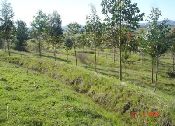| Desertification Risk Assessment Tool |
 |
|
Desertification Risk Assessment Tool is an expert system designed to provide an estimation of land desertification risk through the selection of appropriate degradation processes and corresponding indicators. Risk assessment was performed to identify the most appropriate and effective indicators suited to a wide range of local physical and socio-economic conditions for assessing the effectiveness of the various land management practices in land uses and landscapes prone to desertification. In this context, the advantages of computer technology and specifically of the expert systems are unambiguous. Such an incorporation may be of use in achieving:
In this regard, the Tool may allow the decision-makers to generate appropriate and timely desertification measures. It may also provide a standard for assessing the effectiveness of the various land management practices. The program is designed to run in a Windows environment. An effort was made that the program would be user friendly and self-explanatory, guiding the user step by step.
|
|||||||

Acknowledgement
The DESIRE project was
|
DESIRE brought together the expertise of
26 international research institutes
and non-governmental organisations.
This website does not necessarily
represent the opinion of the
European Commission. The European
Commission is not responsible for
any use that might be made of the
information contained herein. 


